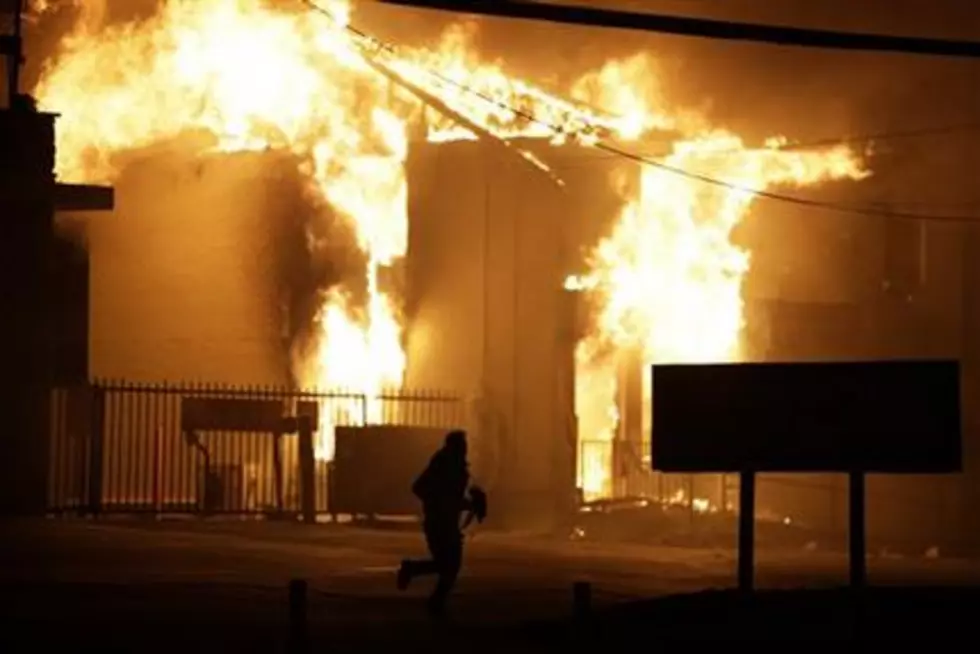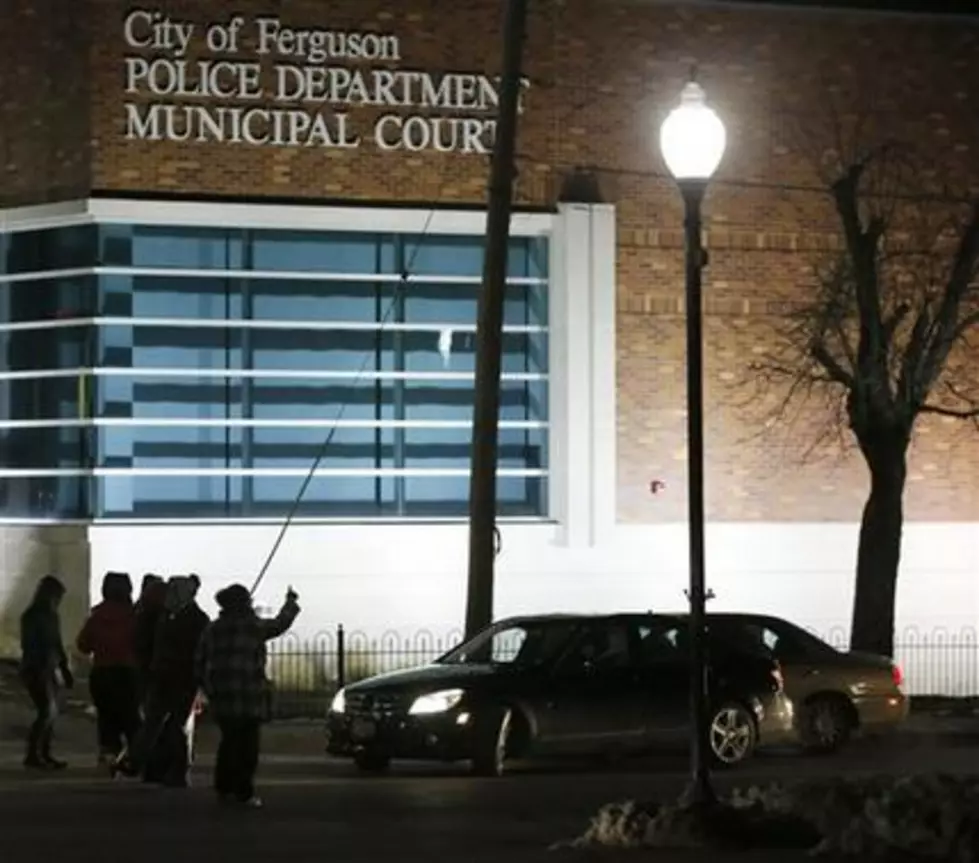
Governor adds National Guard troops in Ferguson
FERGUSON, Mo. (AP) -- Missouri Gov. Jay Nixon has ordered additional members of the National Guard to Ferguson, where violent protests broke out following the grand jury's decision not to indict Officer Darren Wilson.
Nixon's office announced early Tuesday that the additional guardsmen will provide security at the Ferguson Police Department, which was at the center of protests late Monday and early Tuesday. The governor says the presence of additional troops will free up the police to provide more protection.
Wilson shot and killed 18-year-old Michael Brown on Aug. 9. The grand jury decision led to protests in the area. Several buildings were burned down in Ferguson and demonstrators smashed store windows in downtown St. Louis. More than 80 people were arrested.
Monday night's destruction appeared to be much worse than last summer's protests, with at least a dozen businesses badly damaged or destroyed. Authorities reported hearing hundreds of gunshots, which for a time prevented fire crews from fighting the flames.
Jon Belmar, chief of the St. Louis County police, said that unless his agency could bring in 10,000 officers, "I don't think we can prevent folks who really are intent on destroying a community."
The grand jury's decision means that officer Darren Wilson, who is white, will not face any state criminal charges for killing Brown, whose death inflamed deep racial tensions between many black Americans and police.
Prosecuting Attorney Bob McCulloch said the jury of nine whites and three blacks met on 25 separate days over three months, hearing more than 70 hours of testimony from about 60 witnesses, including three medical examiners and experts on blood, toxicology and firearms.
"They are the only people that have heard and examined every witness and every piece of evidence," he said, adding that the jurors "poured their hearts and soul into this process."
In the first flash of unrest after the grand jury announcement, Belmar said he told officers to back off, suggesting they handle the situation as if it were a festival or baseball game. But the situation quickly "spun out of control," as protesters looted businesses and set fire to numerous vehicles, including at least two police cars.
Officers eventually lobbed tear gas from inside armored vehicles to disperse crowds. There were at least 29 arrests, police said.
As McCulloch read his statement, Michael Brown's mother, Lesley McSpadden, sat atop a vehicle listening to a broadcast of the announcement. When she heard the decision, she burst into tears and began screaming before being whisked away by supporters.
The crowd with her erupted in anger, converging on the barricade where police in riot gear were standing. They pushed down the barricade and began pelting police with objects, including a bullhorn. Officers stood their ground.
Speaking for nearly 45 minutes, a defensive McCulloch repeatedly cited what he said were inconsistencies and erroneous accounts from witnesses. When asked by a reporter whether any of the accounts amount to perjury, he said, "I think they truly believe that's what they saw, but they didn't."
The prosecutor also was critical of the media, saying "the most significant challenge" for his office was a "24-hour news cycle and an insatiable appetite for something - for anything - to talk about."
In his statement, McCulloch never mentioned that Brown was unarmed when he was killed.
Brown's family released a statement saying they were "profoundly disappointed" in the decision but asked that the public "channel your frustration in ways that will make a positive change. We need to work together to fix the system that allowed this to happen."
Shortly after the announcement, authorities released more than 1,000 pages of grand jury documents, including Wilson's testimony.
Wilson told jurors that he initially encountered Brown and a friend walking in a street and, when he told them to move to a sidewalk, Brown responded with an expletive.
Wilson then noticed that Brown had a handful of cigars, "and that's when it clicked for me," he said, referring to a radio report minutes earlier of a robbery at a nearby convenience store.
Wilson said he asked a dispatcher to send additional police, then backed his vehicle up in front of Brown and his friend. As he tried to open the door, Wilson said Brown slammed it back shut.
The officer said he then pushed Brown with the door and Brown hit him in the face. Wilson told grand jurors he was thinking: "What do I do not to get beaten inside my car."
"I drew my gun," Wilson told the grand jury. "I said, `Get back or I'm going to shoot you.'"
"He immediately grabs my gun and says, `You are too much of a pussy to shoot me,'" Wilson told grand jurors. He said Brown grabbed the gun with his right hand, twisted it and "digs it into my hip."
Asked why he felt the need to pull his gun, Wilson told grand jurors he was concerned another punch to his face could "knock me out or worse."
After shots were fired in the vehicle, Brown fled, and Wilson gave chase. At some point, Brown turned around to face the officer.
Witness accounts were conflicted about whether Brown walked, stumbled or charged back toward Wilson before he was fatally wounded, McCulloch said. There were also differing accounts of how or whether Brown's hands were raised. His body fell about 153 feet from Wilson's vehicle.
Thousands of people rallied in other U.S. cities, most peacefully, and President Barack Obama appealed for calm and understanding, pleading with both protesters and police to show restraint.
"We are a nation built on the rule of law, so we need to accept that this decision was the grand jury's to make," Obama said. He said it was understandable that some Americans would be angered, but echoed Brown's parents in calling for any protests to be peaceful.
At least 10 St. Louis-bound flights were diverted to other airports because of concern about gunfire being aimed into the sky over Ferguson, the Federal Aviation Administration said.
The Justice Department is conducting a separate investigation into possible civil rights violations that could result in federal charges, but investigators would need to satisfy a rigorous standard of proof in order to mount a prosecution. The department also has launched a broad probe into the Ferguson Police Department, looking for patterns of discrimination.
Regardless of the outcome of those investigations, Brown's family could also file a wrongful-death lawsuit against Wilson.
The Aug. 9 shooting heightened tensions in the predominantly black St. Louis suburb that is patrolled by an overwhelmingly white police force. As Brown's body lay for hours in the center of a residential street, an angry crowd of onlookers gathered. Rioting and looting occurred the following night, and police responded with armored vehicles and tear gas.
Protests continued for weeks - often peacefully, but sometimes turning violent, with demonstrators throwing rocks and Molotov cocktails and police firing smoke canisters, tear gas and rubber bullets. Missouri Gov. Jay Nixon briefly summoned the National Guard.
Ron Johnson, the Missouri State Highway Patrol captain who oversaw Ferguson security during the summer protests, said Tuesday morning that the community must take some responsibility for the business looting that took place after the grand jury decision. A pizza shop, beauty supply store and two auto parts stores were among those that burned.
"Those are dreams," Johnson said. "Those are small-business owners, and we've torn those dreams away."
President Barack Obama appealed for calm and understanding, pleading with both residents and police to show restraint.
"We are a nation built on the rule of law, so we need to accept that this decision was the grand jury's to make," Obama said. He said it was understandable that some Americans would be "deeply disappointed - even angered," but echoed Brown's parents in calling for any protests to be peaceful.
The Justice Department is conducting a separate investigation into possible civil rights violations that could result in federal charges. The department also has launched a broad probe into the Ferguson Police Department, looking for patterns of discrimination.
The Aug. 9 shooting inflamed tensions in the predominantly black St. Louis suburb that is patrolled by an overwhelmingly white police force. As Brown's body lay for hours in the center of a residential street, an angry crowd of onlookers gathered. Rioting and looting occurred the following night, and police responded with armored vehicles and tear gas.
Protests continued for weeks - often peacefully, but sometimes turning violent, with demonstrators throwing rocks and Molotov cocktails and police firing smoke canisters, tear gas and rubber bullets. Missouri Gov. Jay Nixon to briefly summon the National Guard.
Outside the Ferguson Police Department on Monday night, St. Louis County police used a bullhorn to order a crowd to disperse, saying it had become an unlawful assembly. Protesters defied the orders and some chanted "murderer." Minutes later, four gunshots were heard down the street.
Hours before the decision was made public, Nixon urged people to remain peaceful as he appeared at a news conference with the state's public safety director and the leaders of St. Louis city and county.
"Our shared hope and expectation is that regardless of the decision, people on all sides show tolerance, mutual respect and restraint," Nixon said.
Some black leaders and Brown's parents questioned McCulloch's ability to be impartial. The prosecutor's father, mother, brother, uncle and cousin all worked for the St. Louis Police Department, and his father was killed while responding to a call involving a black suspect in 1964. McCulloch was 12 at the time, and the killing became a hallmark of his initial campaign for elected prosecutor.
Nixon declined to seek the removal of McCulloch in the Brown case, but he also called for McCulloch to vigorously prosecute Wilson, who had been on the Ferguson force for less than three years. Prior to that job, Wilson was an officer for nearly two years in Jennings, another St. Louis suburb.
McCulloch, a Democrat, has been in office since 1991 and was re-elected to another term earlier this month.
Among the cases that McCulloch's opponents cited as examples of pro-police bias was the 2000 shooting death of two men in a fast-food parking lot by two undercover drug officers in the town of Berkeley, which like Ferguson is a predominantly black suburb in what locals call North County.
A federal investigation determined that Earl Murray and Ronald Beasley were unarmed and that their car had not moved forward when the officers fired 21 shots. But that inquiry also determined that the shootings were justified since the officers feared for their lives.
McCulloch opted to not prosecute the two officers and characterized the victims as "bums" who "spread destruction in the community" by selling drugs.
© 2014 The Associated Press. All rights reserved. This material may not be published, broadcast, rewritten or redistributed. Learn more about our Privacy Policy and Terms of Use.
More From New Jersey 101.5 FM









